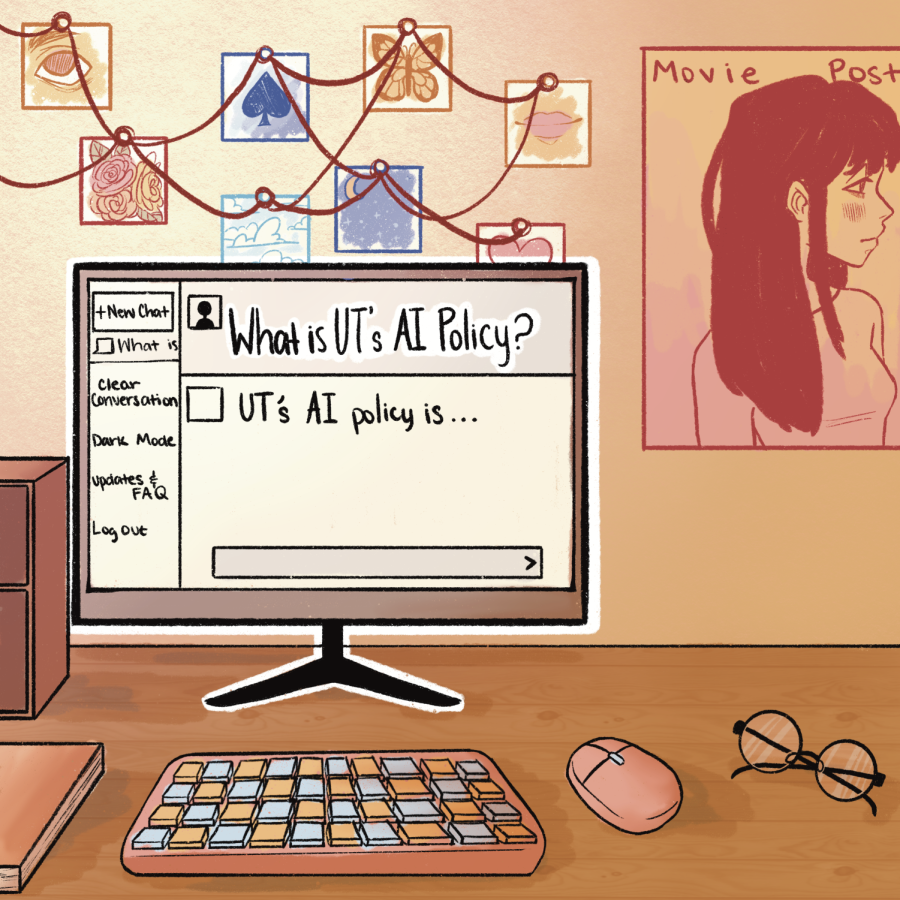A tool for learning or an accomplice for cheating? How artificial intelligence, like ChatGPT, is changing the classroom at UT
June 13, 2023
When Jared Mumm, a professor at Texas A&M University at Commerce, had a sneaking suspicion some of his students used ChatGPT, an artificial intelligence chatbot, to write their final essays, he asked the software if it wrote them. The result? False accusations of cheating and the beginning of a messy conversation about AI’s place in the classroom.
A Texas A&M University at Commerce spokesperson told the Washington Post the university is “developing policies to address the use or misuse of AI technology in the classroom.”
But what are UT’s policies on the use or misuse of AI technology in the classroom?
“There’s actually no change in policy that’s required because it’s already a violation of University policy for any student to turn in work in a class and represent that work as their own work if it’s not their own work,” said Art Markman, UT’s vice provost for academic affairs. “Using an AI system … and then not acknowledging the use of that system is no different than a student who might have someone else write an essay for them.”
Markman said during the spring semester, a University task force evaluated the use of AI like ChatGPT for assignments. In preparation for the fall semester, Markman said the task force will post articles online throughout the summer explaining the University’s approach to AI in the classroom.
The first article, called “5 Things to Know About ChatGPT,” is meant to provide “suggestions for instructors who wonder how this tool may affect their course design and teaching.”
To prevent the use of ChatGPT on an assignment, the website suggests that professors require students to use sources only available on UT Libraries subscription databases and journals because the chatbot can’t access them. Meanwhile, another suggestion encourages professors to see ChatGPT as a tool for students when they are writing.
“As long as the student ultimately adds significant new material and thoroughly edits or ultimately eliminates the output from ChatGPT, they are producing a document that reflects their own work,” the website states.
Ethan Glass, a philosophy and psychology alumnus who graduated in May, said he took a class in the spring called Language and Computers with Venkata Govindarajan. For one assignment, Glass said he gave ChatGPT the LSAT, a law school admissions test, to evaluate how well the chatbot performed.
“It did pretty well on the reading comprehension questions, (and) it did really poorly on the logical reasoning questions,” Glass said. “It tends to generally (do) better when it’s given more text because it has more stuff to go off of.”
Glass said for other classes, like his philosophy classes, he would paste prompts into ChatGPT to view the response and gain confidence in his own writing. However, Glass said he never turned in an assignment generated by ChatGPT or AI.
“I totally think it’s cheating. I think part of the learning objectives in college is to learn how to write and learn how to formulate your thoughts,” Glass said. “And if you’re not spending any time criticizing your thoughts or thinking things through, then you’re just really really missing out on something very important.”
Glass said he didn’t feel disadvantaged when other students use ChatGPT, but he felt disappointed. He said he noticed that one of his classmates used ChatGPT to write a discussion post because his classmate forgot to delete the question they asked the chatbot before posting the response to Canvas.
“I remember walking around the PCL around finals season and people had ChatGPT open, all over,” Glass said. “You couldn’t get very far without seeing the ChatGPT screen. Maybe they’re just enthusiasts about the technology and just for having fun testing it, but I have a hunch that a lot of people were cheating with it.”
In the fall, Markman said the University is “launching a refreshed version” of the University Honor Code. It’s something the University started working on before ChatGPT became available, Markman said, as a way for students and faculty to recommit to UT’s learning environment.
“It’s really not about ‘Can we find clever ways to catch people doing the wrong thing?’” Markman said. “At the end of the day, it’s really about trying to understand why the assignments in particular classes are being given, what skills they’re designed to teach, and for all of us to commit to doing that work and getting the feedback and learning the knowledge and the skills that our classes are designed to create.”
Markman said he sees AI as “more exciting than frightening” and as a tool not only to help students, but to help instructors teach complex concepts in better ways.
“We certainly want people who are teaching to communicate clearly their expectations about particular assignments and when a particular tool should and shouldn’t be used,” Markman said. “But we also want people to think cleverly about ways to teach difficult concepts that might become easier to do when an AI system is available.”
For professors who don’t want AI to be used for an assignment, Turnitin, an anti-plagiarism software embedded into Canvas, launched a new AI detection feature. However the University is currently in the process of vetting the detection software’s accuracy, Markman said.
The Daily Texan asked the ChatGPT chatbot if using it to complete academic assignments is cheating or a tool for learning. Here’s a portion of what it said:
“ChatGPT as a tool for learning, idea generation or to gain a better understanding of a topic can be a valuable approach. It can assist you in exploring different perspectives, generating ideas and improving your overall comprehension. However, it is important to ensure that you are using the information obtained from ChatGPT as a starting point and critically evaluate and verify it through other reputable sources.”



